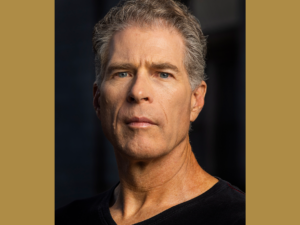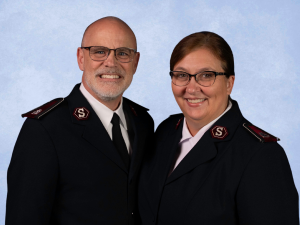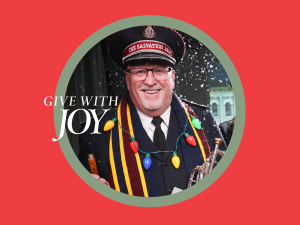Help us love beyond disaster at salarmy.us/socalfire.
This is part two of our winter series, “Warm Hearts, Warm Homes.” Listen to part one here.
Last week, we explored what home means—those mental souvenirs we collect, the everyday moments that make a space our own, and the devastating impact when that sanctuary is suddenly gone. We heard about The Salvation Army’s immediate response to the wildfires that have ravaged Los Angeles communities.
Understanding, of course, things are changing quickly on the ground—as of this recording, The Salvation Army is serving at multiple area evacuation shelters, meeting physical needs and emotional and spiritual care, or what we like to call a “ministry of presence.”
And wherever The Salvation Army shows up, the message is clear: Hope is on the way.
So how does The Salvation Army spread hope to those experiencing their worst days?
For Salvation Army Santa Monica Corps Officer and emergency/disaster services Officer Captain James Fleming, it starts with a conversation.
“We’re asking people their names; we’re making sure we’re having relationship. I’m not just feeding people. This isn’t an assembly line like that.”
For days now, Captain Fleming and The Salvation Army in Santa Monica have been serving at a pair of shelters in West Los Angeles—at the Westwood Recreation Center and Stoner Recreation Center.
Their efforts are part of The Salvation Army’s greater response to the Southern California wildfires, meeting human needs by offering meals, refreshments and a listening ear.
At the shelters, which are operated by the American Red Cross, The Salvation Army is tasked with feeding evacuees—planning and organizing the meals, meal times and serving the meals. They also provide emotional and spiritual care.
As Captain Fleming says, that means constantly walking around and checking on people, getting to know them and their needs.
“That’s how we bring them hope. It’s making them feel seen, not just like somebody laying in a cot…these are people with us. Their lives are in a bad spot, so we’re walking around just building relationships and making sure they feel seen.”
He recognized that need in a woman at the Westwood Recreation Center, who was clearly and understandably having a hard time.
“I could tell she was just having a really, really hard time. And just having a conversation with her, she wouldn’t like let me in emotionally. And I finally just said, ‘Hey, what do you need? Let me help you.’
“She just wanted to go to her storage and get her medication, you know? And so she needed to have a ride. She felt like trapped, and, having broken down that wall, she’s been so much, she’s been relieved. She came back a couple hours later. She was like, thank you so much, you know? “And it’s like every, every individual has their own little thing going on that is to that extreme where they just need their one thing. They’re missing this one element in their life right now.
“We’re trying to get them through this just because they’re having the worst time.”
Back in Pasadena, California, Captains Nick and Becky Helms are adapting to a new kind of ministry.
Like many in their congregation, they were forced to evacuate with their four children as the fires approached. As both residents and spiritual leaders in the community, they have a unique perspective on what it means to help others while experiencing the same uncertainty themselves.
They join us to share their story and help us understand how we can support those who have lost not just their stuff, but their home.
Listen and subscribe to the Do Gooders Podcast now. Below is a transcript of the episode, edited for readability. For more information on the people and ideas in the episode, see the links at the bottom of this post.
* * *
Captain Becky Helms: We had just finished dinner and our kids were scattered around the house. Drew had changed into this onesie pajamas that he has that are from Buc-ee’s, and it has a beaver tail on the back. And he was hanging out in his room and his room is, it faces the street. And so Nick was—
Captain Nick Helms: It faces the canyon.
Captain Becky Helms: Yeah, it faces the canyon in the hills. And Nick was doing the dishes and I had just sat down to do stats. They were due that day. And Drew comes out and he goes, “Mom, Dad, there’s a fire.” And we both said, “That’s not funny buddy.” And he said, “No, I am not kidding.” And so I put my computer over and kind of begrudgingly walk out of our house, and sure enough, there’s a small fire that we see above the hills. And so I run back inside and Nick is still cleaning the dishes. And I’m like, “Nick, he’s not kidding.”
And then I run back outside again. And by that time the fire had tripled in size and embers were flying. And so I run back in again and I’m like, “Nick, we need to leave.” And then police are coming in our neighborhood. Our neighborhood’s three very tiny streets, and they’re yelling at all of us to get out now.
And so we gather up our kids, get them in one of our cars and our dog, and we run upstairs to get all of our important documents that we have in a box, grab medication and we leave with just that. As we were leaving, we drove separate cars and all of our kids are crying and I am trying to keep them all calm and reminding them everything in our house is replaceable. The most important thing is that we’re together and mommy and daddy are going to do everything we can to make sure our family is safe. And me, I’m thinking we’re not returning to our house. If we return to our house, it will be ashes just because of how big the fire was by the time we were driving out of our neighborhood.
Captain Nick Helms: Yeah. We really are on three streets that are kind of secluded, but right up against the canyon and there’s a big street that divides us. We’re in this little strip of Pasadena and then just across the street on Altadena Drive is Altadena. So we’re just in that little section. And the fire was so close to our neighborhood that we didn’t think there was a chance that our house was going to survive that.
And so we met at the corps. We convened and figured out what our plan was for the night. We ended up coming down to Crestmont stay so we could sleep there. But it was a very nerve-racking, I don’t know, 10, 12 hour period where we were constantly checking our cameras at the house. And throughout the night we still had, except for maybe a one-hour period, we could see at least one of the cameras at our house. The rest of them went down, but we still saw one inside our living room. And so just would open it every half hour or so and say, “Is there any fire or anything happening?” And we woke up the next morning and it was still standing there. So by a miracle, yeah, our house survived.
Christin Thieme: It’s unbelievable. It’s one of those things you never think is going to happen, and then all of a sudden it’s happening. It just has to be so surreal to actually be experiencing that in real time. So much of your neighborhood didn’t survive. What was it like for you when you went back and drove through the area? I drove through there last week and it’s almost unrecognizable in many parts of it.
Captain Becky Helms: Yeah. Our little neighborhood survived, but if you go out, there’s two exits to our neighborhood, and if you go one way, everything is gone. And if you go the other way, everything is gone. You have a little bit of guilt about that almost. Why were we spared? And as you drive by, we were able to go see our house the next day. We went up a back way to be able to get there. And we’re driving down streets and houses are still completely on fire. And you’re seeing the, what would it be? The gas lines just shooting up fire. And you hear propane tanks exploding and ammunition going off because of it being in people’s homes. And yeah, seeing-
Captain Nick Helms: Yeah, it was like a out-of-body experience almost just driving by and being like, “Am I really here right now? Is this really happening?” It was certainly humbling for us too. After we went to our house, we tried to go see the house of one of our corps members just to see if it was still standing or not. And so that’s why we were driving through all that neighborhood just to try to go see. And it was a little bit scary to be driving through there with downed power lines and all these houses on fire and not really knowing if a telephone pole would come crashing down. And so yeah, it just felt weird to be there and think, wow, you never think that it would happen to you.
Captain Becky Helms: I think the images of what we saw will be forever scarred in my mind. There’s just no words to describe what we saw that day.
Christin Thieme: Yeah, I can’t imagine. And in addition to this being your home and community and having to evacuate, you’re also Salvation Army officers, or pastors, in the same community where so many of your own congregation members are dealing with the same thing. So how has this affected your congregation? What immediate needs are you seeing among your own church members and in the immediate community, even as the fires are still burning, unfortunately?
Captain Becky Helms: Yeah. We had four members of our congregation, or four families of our congregation lose everything. Two of the houses or homes were generational homes, had multi-generations living in and previously living in. So their homes had been owned for a long time. And so obviously that’s devastating. It’s not just affecting an immediate family. And then we’ve had a number of corps members displaced because still today, past a certain street, you are not allowed to go up there.
Captain Nick Helms: But we’re also learning about all of the contaminants that are in the air, and it’s just not even safe to be in homes where they’ve repopulated. So there are a lot of people who are staying away just for their safety. And so for us as corps officers, it’s really just been for our congregation, it’s been checking in, making sure everybody’s okay, trying to visit people where we can.
Captain Becky Helms: Every day we do a round of driving around, checking in on our corps members. We try and call the families that we know have been affected and displaced by checking in with them each day with a phone call. Often it’s just leaving a message because those families are inundated with people checking in on them, which is such a beautiful thing. The first couple of days we had bought a bunch of cases of water because not able to use the water, and so you’re not able to use it to drink, shower, wash your hands. So we were delivering bottled water and N-95 masks and just letting our corps family know we love them and we’re going to get through this together.
Captain Nick Helms: And we held our, I won’t say our usual Sunday service, but we decided that it was important to offer the space for everybody to come together. And we had three out of the four families who lost their homes came. And I thought it was a really nice time for all of us to just sit in what this is right now and offer some space for people to emote and to hug each other and love each other.
Captain Becky Helms: Because even the people that haven’t lost their home, they’ve experienced significant trauma of either evacuating. We evacuated at probably 6 in the evening, but a lot of the evacuations happened at 3 or 4 in the morning. And so a lot of our families are still processing that. And how do you go back to real life when every time you look on social media, you see a family that you knew or connected with that has lost their home?
It’s thousands of people that are just experiencing this devastation. All of our kids at the corps know so many people who have lost their home, and so they’re also reconciling how do we support our friends and dealing with that grief too, of how can we be there for our friends? They’re not in school right now. Schools have been canceled. And so yeah, it really is affecting every member of our church, whether they’re old or down to the youngest members of our corps.
Christin Thieme: As pastors thinking about all this, how do you even begin to help people process such sudden and devastating loss and not only, like you said, not only the loss of homes, but the loss of that sense of safety?
Captain Nick Helms: It’s a good question. We’re processing it ourselves. We’re processing it with our kids. The biggest thing that we’ve just been doing every time we talk with someone is asking them, first of all, if they’re okay, what their needs are.
Captain Becky Helms: And when we’re asking them if they’re okay, it’s not even asking just, are you physically okay? Are your physical needs meant? We’re really asking how are you emotionally, and I think there’s… While it’s really hard to be going through this ourselves, I think there also is that sense of we understand those ups and downs that everyone is feeling, and so they even get a chance to see us vulnerable and we will sit and just cry with each other if we have to, laugh or-
Captain Nick Helms: We just try to offer a space to have some open dialogue about what they’re feeling. And there’s moments of great relief that we’re all okay, but then there’s the moments of realization for some of our families that there’s just a lot of rebuilding to do, and so as their pastors, we’re trying to reassure them that even though we’re going through tragedy, that God is with us through it all and that he hasn’t left us alone in all of it. He’s walking through the fire with us.
Sometimes it’s just sitting and listening to just being present with the people so that they know that they’re not alone, and one of the biggest things we’ve been trying to do is just letting people know that we’re available. That’s why we try to check in with people every day and make sure that they’re not feeling forgotten or just, but especially by their pastors, people that are supposed to be caring for their souls. So, lots of checking in, lots of sitting and just being available.
Christin Thieme: Is there any particular passage, scripture, message that stood out to you throughout this whole experience?
Captain Becky Helms: Yeah. The day that everything had happened, we wanted to send something out to our congregation, just a letter, and when I was writing that letter, I just was reminded of Isaiah 43, Isaiah 43:2, it gives us this promise: When you pass through the waters, I will be with you, and when you pass through the rivers, they will not sweep over you, and when you walk through the fire, you will not be burned. The flames will not set you ablaze.
God is with us and God’s presence is with us through every trial, and while all of our earthly possessions may have been destroyed by this fire, that can’t consume the hope that we have in the Lord. I just keep coming back to that scripture that God is near. It’s even what I preached about, whether we’re on a mountaintop experience or in our darkest valley, Jesus is near in those experiences. Whether we’re facing uncontrollable anxiety and fear, Jesus is near. Whether we’re rejoicing and we’re so thankful with gratitude, Jesus is near, and so how do we live in a space where we truly believe that Jesus is near, despite the tragedy that we’ve faced.
Christin Thieme: In the midst of everything. What gives you hope, even as you look at the recovery road ahead?
Captain Nick Helms: I think one of the things is just seeing the sense of community that this has brought. It certainly has helped bring out some of the best in humanity, I think. It’s also brought out some of the worst in humanity. We see things like looting and that kind of stuff, but in terms of our community, we’re getting so many people coming by the corps every day saying, “Oh, how can we help? Or what can we donate?” And all that kind of thing. So people want to help, which is beautiful to see just people rallying around each other.
Honestly, our hope is in Jesus and just not focusing on the temporary, what’s here right now, even though it affects us, but focusing on eternity and knowing that when we have that foundation with Christ, anything that happens on this earth. And we know that we’re going to experience trials, we know that we’re going to experience hardships, but even while walking through those things, we have the peace that passes all understanding that, because we know that God is in control, there’s nothing that can happen that he is not watching over.
And that’s what I’ve been trying to focus on in all of this. Anytime that I’m feeling overwhelmed with all the phone calls and all of the requests and the prospect of all of the things that we’ll have to do to rehab our home and helping people recover from this as well, I just come back to the Lord is in control and he’s not going to leave us or forsake us. So, that’s where our hope is firmly planted.
Christin Thieme: I heard you mention that the corps is going to be starting street-to-street response. Can you share a little bit more about that?
Captain Nick Helms: Yeah, so our plan for when evacuation orders are lifted is we’ll have several emotional and spiritual care teams that will be comprised of officers in the Salvation Army from all over the area, but also community members. And we’ll be canvassing the streets to hand out different physical need items like water, cleaning kits, hygiene kits, snacks, masks and-
Captain Becky Helms: Sifters.
Captain Nick Helms: … sifters potentially for families that need to look through their things if it’s safe. But also offering a listening ear while we try to deliver those things. So, if people are really feeling the need to share some of their experience or process some of that, we’ll be there for them offering prayer and pastoral support for people in the community who need that at this time.
I know that we’re also planning to be present at some of the local area connection centers that they set up once the initial phase of the emergency disaster response moves into the long-term recovery response, and so those are a couple areas.
It’s going to be an ongoing thing for a long time in our community, so we just want people to know that The Salvation Army is in this community and dedicated to helping people recover as they figure out what the next steps are on this path.
Christin Thieme: People across the country are watching this all unfold. You said people are showing up wanting to help. What would you want someone to know about how they can go about doing that?
Captain Becky Helms: Monetary gifts are really just the best way for us to be able to help people. That way we can utilize that money that’s donated and actually get gift cards for families that have been displaced, families that have lost everything, so they’re able to go to get things that they want. While donations are a beautiful thing, our gym is pretty much full of a lot of things, and I think the families also want to have that dignity of, “It’d be nice to have some new clothes. It’d be nice to go get the snacks that I like.” And so monetary donations are really the most helpful at this point as we seek to support the families that are displaced and have lost everything.
Captain Nick Helms: It gives us a little more flexibility. While we love and appreciate all the people coming to drop off clothing and bedding and those kinds of things, it becomes a lot to sort through and organize all these things and then to organize the distribution of these items, especially when they need to be moved from place to place. So if we have monetary stuff, it just gives us the flexibility to be able to buy the things that we need, but also support long-term recovery things. If we need to help people with any temporary housing or other things like that, the monetary gifts really help us to be able to support in that way.
Christin Thieme: Absolutely. Like you said, it’s going to be an ongoing situation. I just want to mention that if you are interested in more information or want to give and help in that way, you can go to salarmy.us/socalfires and find all of that information and how to get involved there. Finally, how would you say this experience has changed your perspective on just the idea of home?
Captain Becky Helms: I said at the beginning as I was driving out with our four kids and our dog shoved in the car as fast as we can and our kids saying and asking, “Are we going to see our home again?” and not being able to promise them that we would, I reminded them that home isn’t the building or the house that we live in. We are home when we are all together.
And while that didn’t necessarily take away their fears of as we’re driving away and they’re all looking out the window, seeing the fire just keep expanding, I think it did remind them that we have all that we need if we are all okay. Especially as officers, our homes will come and go and they’ll be different, but what remains the same is if we are together.
Captain Nick Helms: Our earthly possessions are just earthly possessions, but there’s things you can’t replace. Family is one of those things. We are so grateful that our home survived. Certainly, it’s a lot longer of a road when you lose everything, but even if we did, it was just reminding our kids that we are our home so we can reset that up somewhere else. It’s not the physical location that’s going to be home for us, but it’s a sobering thing to be found in this position and just to recognize what you do have to be grateful for.
Additional resources:
- If you are one of the hopefuls, get on the list for the Do Good Digest, our free 3-minute weekly email newsletter used by more than 20,000 hopefuls like you for a quick pick-me-up in a busy day.
- If you are enjoying this show and want to support it, leave a rating and review wherever you listen to help new listeners hit play for the first time with more confidence.
- If you want to help The Salvation Army serve more than 24 million Americans in need each year, give today. Your gift of money, goods or time helps The Salvation Army do good all year in your community.
Listen and subscribe to the Do Gooders Podcast now.












